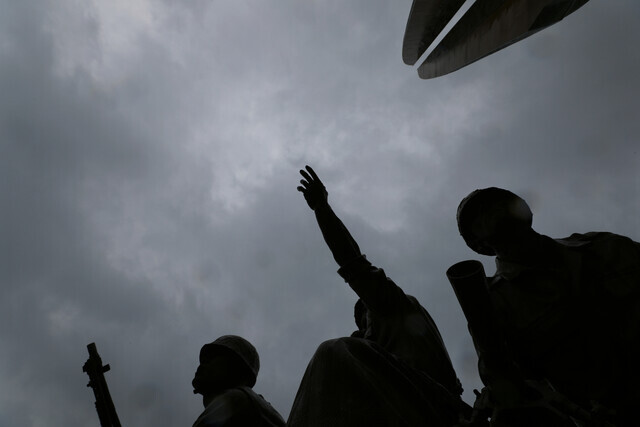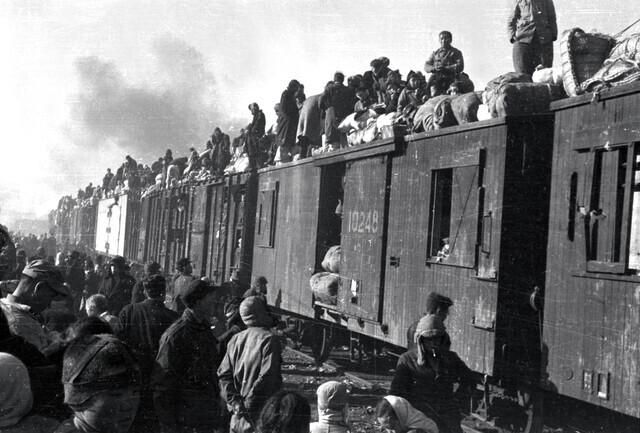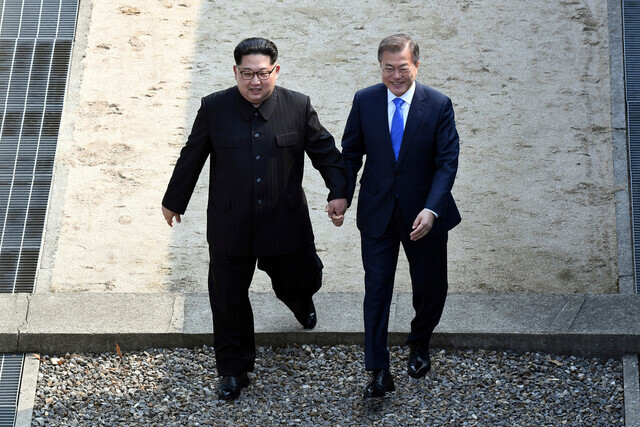hankyoreh
Links to other country sites 다른 나라 사이트 링크
[Editorial] South and North Korea need to be the masters of their own fate

Seventy years ago today, the Korean Peninsula plunged into the tragedy of a horrific war. As North Korean troops swept across the 38th parallel, the Cold War – rooted in the conflict between the US and the Soviet Union – exploded onto the Korean Peninsula. Korea was sacrificed on the altar of the struggle between those superpowers: the ensuing war resulted in the death of more than 3 million people, or 10% of the population of South and North Korea, and the country was reduced to ashes. The fighting stopped with the Korean Armistice Agreement of July 1953, but the belligerents never signed a peace treaty or even officially ended the war. Mutual hatred, the suffering of family members separated by the war, and the division of one nation into two political systems have persisted for seven decades now, in an endless war that chokes the Korean Peninsula.
When the leaders of South and North Korea shook hands and declared that there would never be another war on the Korean Peninsula in Panmunjom on Apr. 27, 2018, we were thrilled by the hope that the armistice would be replaced by a peace treaty and that South and North Korea would move together toward peace and prosperity. In a speech to the citizens of Pyongyang on Sept. 19 of that year, South Korean President Moon Jae-in said, “We have lived together for five thousand years and lived apart for seventy. Let’s move forward together into the future.”
But today, the Korean Peninsula is once again wrapped in conflict and enmity. Inter-Korean relations have been on ice since the North Korea-US nuclear talks broke down in the Hanoi summit last year. This month, North Korea severed all direct lines of communication with South Korea and blew up the Inter-Korean Joint Liaison Office in Kaesong. Kim Yo-jong, first deputy director of the Central Committee of the Workers’ Party of Korea (WPK), has released a flood of abusive language targeting Moon. The North has threatened to take military action against the South, to redeploy troops to the Kaesong Industrial Complex and to the Mt. Kumgang tourism complex, and to launch propaganda leaflets into the South. That further deepens our disappointment over the lack of progress on the Korean Peninsula Peace Process over the past two years. It’s frustrating to think that we face a Sisyphean struggle, straining to push the boulder to the top of the hill only for it to roll back down, over and over again.

It’s a relief that North Korean leader Kim Jong-un deferred the plans for military action against the South on June 23, pausing tensions that had been nearing the brink of a crisis. Having sent a clear message to South Korea and the US, North Korea likely concluded that it needs to keep the situation from getting out of control. It’s also notable that Kim Jong-un, who had been out of the spotlight recently, has taken the role of halting hostile activity toward the South. But North Korea has only deferred, and not canceled, its plans; in other words, that doesn’t completely resolve tensions, nor does it open the path to dialogue.
The rapid deterioration of inter-Korean relations in recent weeks is a keen and painful reminder of the fact that the armistice arrangement has been maintained for 70 years and that the war has never officially ended. The armistice agreement is fundamentally sustained by a number of factors, including the military standoff between South and North Korea, the North Korean nuclear program, and the involvement of foreign forces in the Cold War alignment.

As former White House National Security Advisor John Bolton’s memoir illustrates, American hardliners are opposed to improving inter-Korean relations and to dialogue leading to denuclearization. The time has come for us to stop depending solely on the US. South and North Korea are the masters of Korean Peninsula affairs, and they must seek a breakthrough together. On July 24, 170 religious and civic groups began collecting signatures from people around the world calling for a peace treaty. This campaign is a meaningful attempt to draw upon civic society and international opinion to find a solution to the armistice agreement.
We need to manage the immediate crisis wisely while finding a way for South and North Korea to slip out of the bonds of the Cold War alignment and to move down the path toward peace and prosperity. Given the coronavirus crisis and the new Cold War shaping up between the US and China, there’s an even greater need for South and North Korea to peacefully resolve the nuclear issue and build a future of joint prosperity. Inter-Korean reconciliation and cooperation are a key solution to the coronavirus-caused economic crisis as well as a way to prevent the Korean Peninsula from being caught up in the new Cold War and sucked back into the maw of war.
We need to disabuse ourselves of the notion that inter-Korean relations can’t improve until North Korea-US relations are resolved. Rather than waiting for the results of the US presidential election in November, South and North Korea need to make the first move. Inspired by the dream of peace on the Korean Peninsula, we must shake off the curse of Sisyphus and climb up the hill once more, with a tight grip on inter-Korean agreements.
Please direct comments or questions to [english@hani.co.kr]

Editorial・opinion
![[Column] Season 2 of special prosecutor probe may be coming to Korea soon [Column] Season 2 of special prosecutor probe may be coming to Korea soon](https://flexible.img.hani.co.kr/flexible/normal/500/300/imgdb/original/2024/0426/3317141030699447.jpg) [Column] Season 2 of special prosecutor probe may be coming to Korea soon
[Column] Season 2 of special prosecutor probe may be coming to Korea soon![[Column] Park Geun-hye déjà vu in Yoon Suk-yeol [Column] Park Geun-hye déjà vu in Yoon Suk-yeol](https://flexible.img.hani.co.kr/flexible/normal/500/300/imgdb/original/2024/0424/651713945113788.jpg) [Column] Park Geun-hye déjà vu in Yoon Suk-yeol
[Column] Park Geun-hye déjà vu in Yoon Suk-yeol- [Editorial] New weight of N. Korea’s nuclear threats makes dialogue all the more urgent
- [Guest essay] The real reason Korea’s new right wants to dub Rhee a founding father
- [Column] ‘Choson’: Is it time we start referring to N. Korea in its own terms?
- [Editorial] Japan’s rewriting of history with Korea has gone too far
- [Column] The president’s questionable capacity for dialogue
- [Column] Are chaebol firms just pizza pies for families to divvy up as they please?
- [Column] Has Korea, too, crossed the Rubicon on China?
- [Correspondent’s column] In Japan’s alliance with US, echoes of its past alliances with UK
Most viewed articles
- 1Is Japan about to snatch control of Line messenger from Korea’s Naver?
- 2‘We must say no’: Seoul defense chief on Korean, USFK involvement in hypothetical Taiwan crisis
- 3S. Korea “monitoring developments” after report of secret Chinese police station in Seoul
- 4The dream K-drama boyfriend stealing hearts and screens in Japan
- 5Division commander ordered troops to enter raging flood waters before Marine died, survivor says
- 6[Editorial] New weight of N. Korea’s nuclear threats makes dialogue all the more urgent
- 7No good, very bad game for Korea puts it out of Olympics for first time since 1988
- 8[Column] ‘Choson’: Is it time we start referring to N. Korea in its own terms?
- 9‘Weddingflation’ breaks the bank for Korean couples-to-be
- 10[Column] Season 2 of special prosecutor probe may be coming to Korea soon